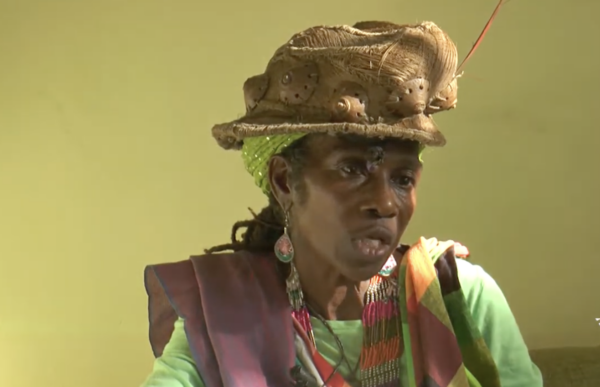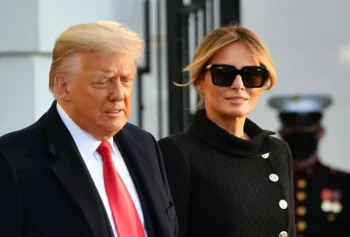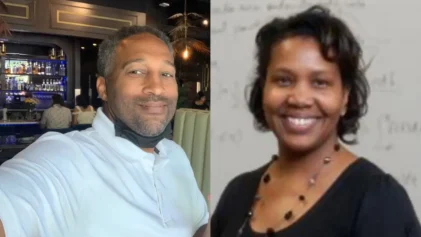One of the leaders of the descendants of Jamaica’s Afro-Indigenous people has apologized for helping enforce slavery centuries ago on the Caribbean island.
The Maroons were Jamaica’s first enslaved Africans who fought and freed themselves from captivity. They agreed to a treaty in 1739, to maintain their freedom and land granted by the British under two conditions. They had to stop slavery rebellions and return runaways to plantations.

Nearly three centuries later, a high-ranking Maroon has apologized for her ancestors’ part in keeping Africans in bondage, the Jamaica Observer reports. Enslaved Jamaicans were not fully emancipated until 1838.
“We regret the hurt and sufferings caused from such actions. We take total responsibility on behalf of our ancestors,” said paramount chieftainess and Queen of the Maroons Gaamang Gloria “Mama G” Simms.
“We realize that we cannot undo the past, but we can remedy the situations through reconciliatory actions that will repair the damage and rebuild trust so that these behaviors will not be repeated,” she said.
Simms’ apology came eight days after the anniversary of a slavery rebellion led by Chief Takyi, a West African enslaved on the island. Takyi and his followers launched an attack on their captors on April 7, 1760, killing white masters and overseers on the Frontier Plantation and toppling British colonial forces at the parish’s capital.
It was the biggest slavery uprising in Caribbean history up to that point, according to reports. Takyi was killed by a Maroon during the uprising and beheaded.
However, another Maroon leader has since said Simms had no authority to issue the apology and it was made without a consensus from other Maroon leaders.
The Jamaican government had declared April 8, Chief Takyi Day in memory of the rebellious leader. Simms seemed to recognize the need for the remorse then, a week prior to her formal apology that she sent to the local paper.
“This aspect of our history has left behind lingering wounds that must be addressed through a truth and reconciliation process,” Simms said on April 8.
“This [Chief Takyi Day] declaration comes from the governor general, whose role is to represent the same ruling power that wrote the Maroon treaty, with clauses that demand them to suppress rebellions and capture the escaped enslaved. This was a conflict of interest and remains a hurtful scar on our history. Let us, as liberators and freedom fighters, take responsibilities for what our ancestors have done. Let us move to heal the rifts.”
The Spanish initially captured native Arawaks and ruled Jamaica for two centuries. They also bought enslaved Africans to the island for free labor. Hundreds freed themselves and helped free others with violent revolts. The Spanish labeled the rebels “Maroons,” which means “fierce” and “unruly.”
There are two divisions of Maroons in Jamaica based on location. The Windward Maroons live in the eastern region of the island, and the Leeward Maroons live in the west. Simms said she is a descendant of the Trelawny Town, part of the Leeward Maroons.
The Maroons later helped Britain upend the Spanish on the island. However, once the Spanish left Jamaica, the Maroons turned on the British, erupting into decades of fighting until the Leeward and Windward Treaties of 1739.
The agreement called for Maroon leaders and their successors to “use their best endeavors to take, kill, suppress, or destroy”… “all rebels wheresoever they be, throughout this island” unless they submit to the terms of the treaty.
Maroon leaders at the time also agreed to “immediately” send back any Africans that ran away from their enslavers. The British government rewarded them 30 shillings — about $1.95 today — for each fugitive.
The Maroons also reportedly helped the British squash a Black rebellion led by Baptist Deacon Paul Bogle in 1865, over the wrongful conviction of a Black man. Bogle marshaled civil unrest for two days until the British government invoked martial law. The Maroons captured Bogle and delivered him to the British government.
Bogle and one of his key allies were hanged as a result. They were later named national heroes. There is a current movement to recognize Chief Takyi as a national hero.
A leader of another Leeward Maroon community came forward on April 20 and has raised questions about the authenticity of the apology. Accompong Maroons Colonel Richard Currie, said Simms was not elected by the Maroons of Jamaica as queen or paramount chieftainess.
“The reality is that we are not against apologies or reconciliation, but we are against acts of representation for people who do not know her as a leader,” Currie said in an Instagram post. “The reality is that there is no official position called ‘Paramount Chieftainess” or “Queen of the Maroons’….”
However, Simms was installed as paramount chief by Maroons from Suriname in a ceremony that was captured on YouTube in 2014. She is also the founder and director of the Maroon Indigenous Women Circle. She told Nationwide News on April 21 that she is indeed a Maroon.
There were mixed responses to Simms’ apology on behalf of the Maroons. Some Jamaicans recognized that the Maroons had little choice but to agree to peace after 80 years of war and to secure their freedom. Many welcomed the apology.
“This is a timely and welcome apology. I note that it has come from Paramount Chieftainess MaMa G Simms, who has been a Maroon leader for decades and us recognized by indigenous Caribbean people as a true defender of their rights,” Barbara Blake Hannah responded on Facebook.
“An apology settles the dust of many evil deeds done in slavery days and, coming as it does on the anniversary of Takyi’s rebellion in which Maroons fought alongside the British, it strengthens the brave and heroic efforts of those who fought for our freedoms in that rebellion.”
Others rejected the apology and called the Maroons “traitors.” Some are demanding reparations and accused the Maroons of self-segregation. There were also calls for solidarity and for holding the British accountable for enslaving Africans on the island.
“We are all one, I refuse division in EVERY aspect,” Elizabeth McDermot wrote on Facebook. “All of us are connected, support each other. Best we live our lives from today forward.”


